www.bryangardner.com
May 2005
Home
May 2, 2005 M #
Mind Controlled Robotics
I just read this today. They've successfully wired a robotic arm (with about 100 nodes) into the motor control part of a monkey's brain... and he's learned to use it to eat!!! It didn't really matter where they stuck the wires into the brain, as long as it was it was in the motor section. The monkey learned what made the arm move in which way, and it learned to eat with it. They want to move to humans in 2 - 4 years.
Monkey Brain Controlled Robotics
It's the coolest thing in the world when we find ways to do things that we only dreamed of before. I think I'm into this technology.
* * *
Corporate BenefitsSo, I picked up my new American Express Corporate Card for whenever I travel on company business. I glanced through the paperwork supplied with it, and read this under the "Benefits" section.
The full Benefit Amount is payable for accidental loss of life, two or more members, sight of both eyes, speech and hearing or any combination thereof. One half of the Benefit Amount is payable for accidental loss of: one member, sight of one eye, speech or hearing. "Member" means hand or foot. One quarter of the Benefit Amount is payable for the accidental loss of the thumb and index finger of the same hand. "Loss" means, with respect to a hand, complete severance through or above the knuckle joints of at least 4 fingers on the same hand; with respect to a foot, complete severance through or above the ankle joint. The Company will consider it a loss of hand or foot even if they are later reattached.
What kind of sadistic, penny pinching Attorneys/Accountans put that together?
*
* *
The Non-BloggerSince Derek refuses to blog, and many of my readers are greatly entertained by the random life of Derektool, It becomes my privilege to post a piece of his weekend.
He dropped into town to meet up with some friends at Six Flags (or one of those places), and I happened to be heading out to the desert to lock away the world and work on my book at the same time his other friends abandoned him to drive back to Arizona. It never takes long to drop back in step with a good friend. We had a good group of engineers there at BYU. There's a reason we all became friends, and that reason doesn't change.
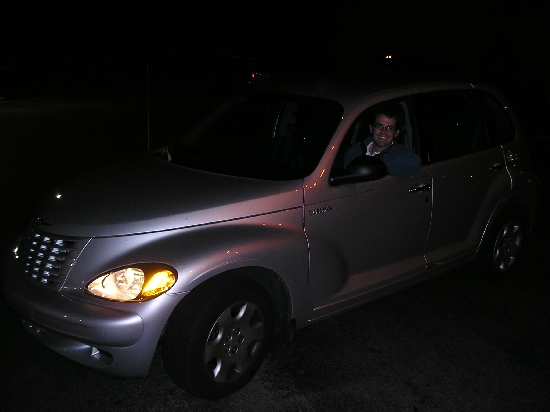
Derek needs a new car. He
rented this PT cruiser because the White Pony isn't up to the challenge
anymore.
I think everybody needs to email their vote for the most fitting car.
I think everybody needs to email their vote for the most fitting car.
The next day he was solo in the middle of downtown LA. Experienced a protest, saw the oldest house in LA, a few other things, and even bought a suit. I can't figure out why Derek would buy a suit in LA?
And one more small tid- it would be a shame to overlook. He still hasn't replaced his wallet after getting robbed in Costa Rica. So, true to form, he carries all his cards, cash, and whatever else you keep in a wallet, in a clear ziplock sandwich bag. Whatever works. Right?
May 3, 2005 T #
A Successful Revolution
I came in from my morning run, and made the mistake of turning on my computer to jot down a quick note for the preface of my book. It grew beyond the quick note. It's too long to fit now, but I think it's worthwhile.
Him / Her
May 4, 2005 W #
Polar Experiences
I'm going to let the Him / Her issue drop. It's not something I think much about anyway. But just for balance sake, I got two emails yesterday, each from entirely different ends of the spectrum.
- - - - -
James:
I was just scanning your blog and I read this: ...( the "Now speaking more seriously about this issue..." paragraph).
Are you being "serious"? There is so much racism and sexism in the world today, that you can't possibly be serious. Just because the Ku Klux Klan is not endorsed publicly, doesn't suggest that it is not prevalent from a more passive role. Ask a black man if he thinks racism has died, and he'll refer you to the last day or two when he was followed by a police man into a store, or some other practical experience. Perhaps you might mean that the age of denying racism or accepting oppression is gone, but the age of racism where it is still highly pervasive remains. Anyway, I thought I would contribute to your blog than just only read this time.
- - - - -
Amber:
A few thoughts on the him/her battle....
If the war is really over, then why do you need to mention this him/her battle in your book at all. Just as continuing to print and argue about the tyranny of King George is a waste of time and energy, wouldn't printing in your book about the him/her battle be a waste of time and energy also... if the war is really over. If you somehow feel threatened enough that you need to include your him/her comments in your book, then is the war really over?
I work in a field made up of mostly men. But I don't consider it to be male "dominated." I think men tend to have more of an interest in technology, and therefore the field is made up of mostly males. But I have never felt as though being a women has hindered my progression or my success.
I end up in meetings and in projects all the time where I am the only women. Do they treat me differently? Yes. Usually they treat me more as a women, and I appreciate this. They try their best to at least not swear or tell crude jokes around me, and generally respect me as a women. Sometimes they forget and aren't so successful at these attempts. But I can tell they are at least genuinely trying, so I don't hold it against them. But I've never felt as though they thought I was less capable or less intelligent because I was a women.
Do I feel as though I am sometimes perceived differently because I'm a women. Yes. Many, many times I've mentioned to people that I work at a tech company and they've responded "Oh, are you an admin there?" When I tell them "No, I'm a software engineer" they sometimes aren't quite sure how to respond. But, being perceived as something different doesn't make a person something different. So I still never felt as though that really hindered my progression or my success.
- - - - -
It's a big world with many people experiencing many different things. I like Amber's point:
"Being perceived as something different doesn't make a person something different."
I don't like controversy. I think I'm going to stick to playful things on this blog. Life is too much fun to stress.
May 6, 2005 F #
This is what it feels like being alive.
* * *
And this is what it feels like to be sitting in the
airport because it took 15 minutes to find a u-turn, dropping me into
the airport 25 minutes before my flight leaves, and facing a gate agent
who loves watching people miss their flight. That's how I was feeling, so I hit play on that when I opened up my computer to use the two hours now at my disposal. Coincidentally, iTunes was on shuffle, and the very next song that popped up was this.
And then it occurred to me that the Horn Intro happens to be from the Modest Mouse album from "Good News for People who Love Bad News." That's exactly who that pompous gate agent is! Stupid lady. I hate dealing with people who are disappointed with their own life, and seek reassurance in watching other peoples plans not pull through.
But now I'm listening to the rest of that swing album, and when I'm done blogging, I'll get some writing done for my book. It never bothers me to throw a schedule to the fan, I just don't like it when it affects other people. My parents just landed in San Francisco, so I'll have to meet up with them at my cousin Andy's reception instead of heading there with them. So goes it.
For all those who think showing up to the airport 40 minutes before a flight is totally irresponsible (probably the majority of the traveling world), this is the John Wayne Airport (aka Orange County, Santa Ana, SNA, flying out of Newport). This is my favorite airport because it's small, security is fast, it looks nice, and the people here look nice. I shoot for 1 hr to 45 minutes early, and that is always plenty of time to read or write before the flight.
One problem.
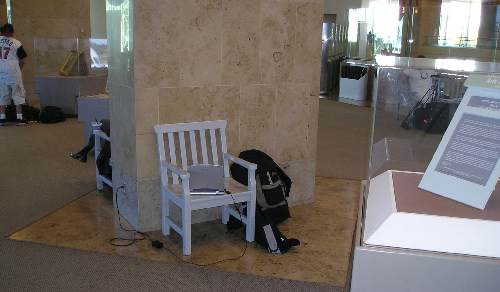
You're looking at one of two spots in the ENTIRE AIRPORT where there is a plug within 10 ft of a chair!!!
(I need a new battery. Only getting 30 minutes before this one flashes off). But it's not that bad because most of the staff here are pretty relaxed, and they don't mind if you pull a row of chairs out of formation to plug in your computer and work.
*
* *
For the record:
4: 30 flight. The gate agents didn't even show up until 4:05. It was 4:10 when they made their first announcement about the flight. That's 20 minutes before the flight, the same time span I arrived for the last flight. Security took five minutes. I could have made it to the original flight before they even started boarding my row.
It's (almost) never too late to get what you want, as long you don't stop at the first sign of defeat.
Why don't more people learn this?
May 8, 2005 O #
Andy and Susan decided to get married sometime back in February (I think). They didn't really elope, but after dating for almost 2 years, they thought that it was ok to decide to get married, and go through with it all in a week. No wedding stress. Just a small quick wedding followed by a couple weeks in Italy. The belated reception (or whatever you call it) was really nice. It's always worthwhile taking excuses to get together with ... I was going to say friends, but they're all family.
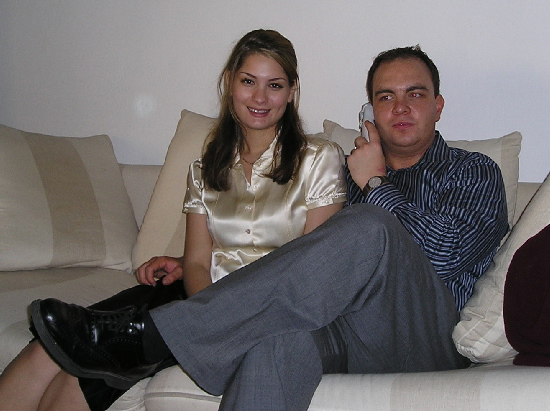
There are always so many reception pictures that all looked the same. I liked the more informal, next day after lunch, back to life at their place type of shot.
It occurred to me at the reception that I had the privilege of being Andy's first engineer. He was chasing an idea for a fitness station accessory, and he needed an engineer to help with the modeling, design, and so forth. I never found out what happened with that product. There are bigger things worth talking about now.
Andy is working at the Children's hospital at Stanford, developing a solution to the information problems hospitals have with the hoards of patient records they need to keep, and sharing those records between hospitals. Give him a few years, and he'll be running the place. Actually, that's not him to run the hospital. He's too creative for that. He'll build and run the largest medical services and equipment supplier corporation in the country. That's Andy.
* * *
Everybody split on Saturday, so I hooked up with Derek. He's friends with some people who threw together a kickball league. That's the first time I've played kickball since 3rd grade. Derek has some cool friends. Then a few of us walked around downtown Palo Alto.
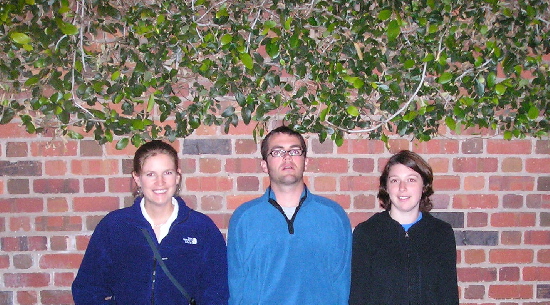
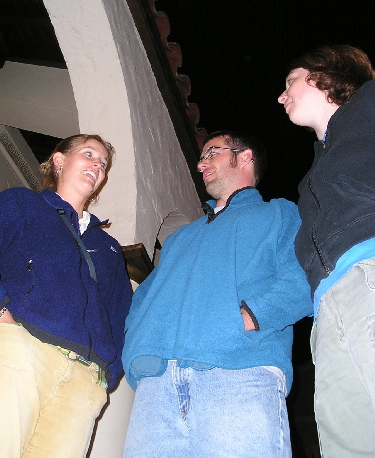
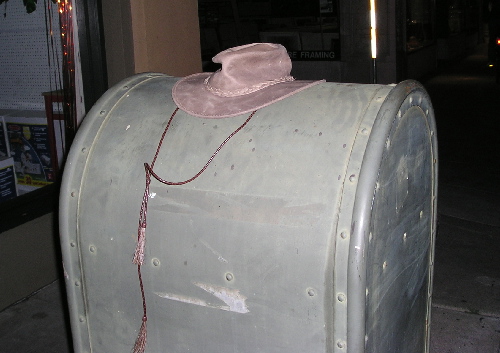
*
* *
Diplomacy Dilemma
# So a couple months ago I made some entries about a Radiator Plate I was getting an outside machine shop to make for us. I was pretty up-beat about the guys making it, and how everything was turning out. It looked like the schedule we wanted was going to pull through, the part would be made right, etc. Well... We finally got the part in our hands last week... pretty darn late. The important part was exactly what we were hoping for, so I'm happy about that. I learned a few things about dealing with outside people though.

I'll bypass the entire story, but here's what I learned.
Sometimes, the best way to help somebody not make themselves look like a big idiot is to point out when they're looking like a little idiot. (Actually, it's sort of a three-way lesson). If you want a job done right, you have to be willing to point out something that looks screwed up, even if they guy will be embarrassed. And last. It's a good idea to retrace the tracks of somebody who says they've got everything taken care of.
My first indication on this job should have been the fact that when I met the project manager in charge of this part, half of what he talked about was how other people were always screwing things up, always responsible for making him or his company late, etc. But I just blew it off. People who complain have never got in my way before, they just get in their own way... but I've never been depending on them before either.
After they had this industry expert machinist get the delicate ridges taken care of, they took the part back to their shop to get the easy machining done. It was on schedule at this point. I was told it was slated for the next morning. I followed up every other day, and was told of progress, but it sounded ridiculously slow. Then a week later, I got a question about something that would have needed an answer before they could have even begun machining anything on the part. Hmmm. Then another week later, I get a question asking if we can change the drawing on some holes their machinist had drilled, that weren't on the drawing. What?!? (I found out their quality rating with NG is on the verge of dropping low enough that we can't send them anymore work). So I go to look at the screw-up. Fortunately it was totally inconsequential, but these holes came from nowhere, and had no apparent relevance to the part.
"Oh well. Let's just get the part done. It'll work."
I noticed something else during this visit. On the back we had 32 holes that needed stainless keenserts in there. The thermal cycling and different expansion coefficients between stainless bolts and aluminum threads could cause galling on the bolts. The keenserts aren't a necessity, but they were on the drawing, and they're one of the things I clearly pointed out when I made the first visit.
Here's where I made my first mistake. I don't like putting people on the spot and pointing out where they screwed up. I've found that some people get defensive, and it makes working difficult from there on out. If you make a suggestion under a scenario where they can save face, it makes it easier. They can fix their mistake, and they don't feel stupid. Out in the shop, I didn't say anything about the keenserts. I did look at them closely enough that he could notice, but I didn't say anything. Back in his office, I pointed out the keenserts on the drawing, and he said they're going to put those in. Ok. Two days later when I made another call, I mentioned the keenserts again, but I never explicitly stated that the holes had already been tapped too small for the keenserts. He said things were going to be all there, just as drawn.
At this point, I wasn't so sure about how on top of the job this guy really was. He said the paint shop was ready and expecting the part, but another engineer at our place suggested I call. I made the call, and the paint shop (a specialist shop in Salt Lake City we knew that deals with this paint), vaguely recalled talking with this guy a month ago, but hadn't seen or heard anything since. They hadn't even received a paint spec to order from. I got that stuff emailed to them, and the paint vendor quoted a 1 month lead time for the paint!!! We contacted Space Dynamics Lab at Utah State Univ, who had some of this paint they could use for now and then replace when their order came in. If I hadn't made that call, we would have had this sub contractor blaming the paint shop for not being ready, and another 4 weeks on the part.
When the part got back from painting, he asked me about the keenserts we wanted on the back, and if they were really necessary. What?!?!? I talked with our other engineer, and we decided to just get the part back before they really screwed it up, and we were up against a second deadline for the testing we wanted to do. I like allowing people to save face, but sometimes doing that only results in allowing poor quality work.
Now I get to revamp my tactics for dealing with people on projects.
May 11, 2005 W #
This is what it my mind looked like
on Monday.

Running in oblong
circles, dizzying, cracked, and flaking.
But I had a date that evening, and it turned out to be one of the best evenings I've had in a few months.
The paint we use is a little tricky under vacuum and thermal cycling. It has to be applied with a thickness of .002" +/- .001". That's not a lot of room for error. We measured one of the flakes and it was .0045". We're sending it back to the paint shop. They'll chemically strip it, and re-paint it. Then another 72 hr vacuum bake at 500K, and we'll see if it works... again. Let's just hope those sharp ridges don't get dinged in the process.
May 15, 2005 O #
I probably should post something about the wedding... I'll do that later. It was a lot of fun, but this isn't a good place for cropping pictures. I was a bit surprised though. It seems like I spent time with everyone except Greg and Erika. I guess that makes sense, but I wasn't expecting it. Glad to have Erika in the family... and glad to be in the family I am. All our cousins, aunts and uncles, and friends... we're a pretty good crowd.
*
* *
Humanitarian Instinct and Separating Society from Individuals #
Waiting in the airport.
I've been reading Jack Welch's book, Straight from the Gut. He was the CEO of GE for the past 20 years. I recently read through his section The People Factory. To summarize this performance policy he implemented, each year they do their performance reviews on everyone in the corporation, and split them into A's (top 20%), B's (middle 70%), and C's (bottom 10%). They keep raising the bar by always eliminating the bottom 10%. (while greatly rewarding the A's). They put a lot into helping these C people find new jobs, but they do get rid of them. This is easy the first year, not so easy the second year, and by year 3 the managers are fighting for each one of their employees... but they still insist on identifying the bottom 10%, and sending them elsewhere. This hard line policy earned Jack the title as the "Toughest Boss in America." This has been rolling through my mind for a bit.
At a first glance, this seems like a good policy. You're continually retaining and developing the very best people. Then on the first thought toward the "human element," it seems like a terrible policy. You're driving good people out of their jobs, right? Is this really good for the people? Let's look at it.
If you look at the individual, it's not good. If you look at the individuals (plural), it is good. Jack points out that we have measurement and performance standards all the time we're growing up, so why should that disappear when we're not kids anymore? Grades in school, tryouts each season for sports teams or musical groups, application processes for universities... and if you stop performing at any of these places you have been accepted to, you will be asked to leave the university or team. Why should that stop when you finish school? Of course the application process continues for those climbing the ladder, but why should the elimination process stop? The only real answer for that is our humanistic aversion to causing pain for others.
It is in our nature to share the pain we perceive in others. We relate to their pain, having experienced it in our own lives, and we want to avoid causing any further pain being experienced by others. My Diplomacy Dilemma from the last entry is rooted in this tendency. It is a very beneficial natural instinct, and is one of the key motivations to the development of the societies we create. We all see ourselves in others. As a result, we want for them what we want for ourselves. Conversely, we also want for ourselves what we perceive is wanted by them. (We'll leave that for another time).
Like all instincts, this "Humanitarian Instinct" needs to be understood and controlled. If we thoughtlessly follow every instinct of hunger, panic, anger, sexual attraction, fear, fatigue, (to name a few), we will not build quality lives for ourselves or for those around us. We don't need to repress our instincts, desires, fears, etc, but we do need to acknowledge them, understand them, and thoughtfully choose how to act with regard to them. We each have a conscious thinking mind, and that is what we are to use it for. They are part of our existence, just as our instincts are part of our existence. They are both tools, and are most effectively used complimentary to each other.
One error this Humanitarian Instinct gives us a tendency toward is to blindly remove Society from Individuals. We are acutely aware of the people with whom we immediately live. We don't want to cause them discomfort or pain (by telling them they're under performing at their job). We feel that by causing our immediate neighbor pain, we are causing pain to society at large. That Individual is a part of Society, and cannot be removed from Society, so our tendency is to shelter them from pain / discomfort as long as we can afford to. We think we're doing them a favor... and we are, but at a cost to Society. We try to remove Society from this Individual. Our big picture disregard is what allows us to believe that this one singular Individual, or even their whole family, are somehow independent of Society. We are not aware of the macro effects of our actions, so we are able to believe that how we interact with this single Individual will not affect Society at large.
The reality is that every Individual is part of Society, and how we treat every Individual is how Society as a whole is treated. If we allow Individuals to under perform, then we are allowing our whole society to under perform. Many people are willing to have technology move forward at a slower pace in order to have a more comfortable life (I'm one of them. Technology brings us comforts, but rate of change brings us discomfort). But we must understand the economic principles at play. The way business and economics works, we cannot remain stagnate or the economy will collapse. Furthermore slowing our acceleration is (in many ways) stagnation. We must treat every Individual as part of Society. Nobody is an island. We are a society. That Society is built with every individual, and we cannot remove the larger picture (Society) from each of these smaller pictures (Individuals).
Our instincts are built to operate on Small Picture awareness. Our minds are built to operate on Big Picture awareness. If we always operate on our Small Picture instincts, we will always be operating according to the Individual needs we perceive. Society can be forgotten, and this can turn to our destruction. This is like loosing all discipline in our personal lives. If we always operate on our Big Picture considerations, we will always be operating according to the Society needs we perceive. Individuals can be forgotten, and this can likewise turn to our destruction. This is like loosing all the immediate enjoyment that comes in our lives, and becoming machines.
We're people, not machines. At the same time, we're people, not animals. We collectively build our lives. We do not exist independent of society. If we want quality lives for ourselves, we must build a quality society. If we want quality lives for ourselves, we must enjoy our lives while we're here. If we want quality lives for ourselves, we must be sensitive and intelligent about our actions and interactions.
Boarding now. Perfect timing.
May 17, 2005 T #
Moab - The Desert Sport Mecca
Nobody in California knows what Moab is!!! It's absolutely astounding! I thought that was one of those places you learned about ever since elementary school. I had to explain to four different people today what Moab was, and what you do there, because they'd never heard of the place. And at least one of them drives an SUV!!!
So for all those Californians who haven't traveled outside of Hollywood:
Moab is the Desert Sport Mecca of the U.S. Any sport you do in the desert, is great for doing in Moab. 4-Wheeling and Mountain Biking are the primary purposes for its existence, and it has its fair share of Rock Climbing as well, not to mention some of the best hiking trails you'll find on the planet. If you're still confused, I'll post pictures when we get back from the long weekend there.
May 26, 2005 R #
A Successful Excursion

May 28, 2005 S #
Lifestyle Habits
Something just occurred to me. As I sat down to start working on my book this morning (the first weekend in 6 that I've woken up in my own bed), I realized that this is the same way I lived in college. At BYU, I would spend Wednesday and Thursday getting ahead on my homework, then Greg and I would take off for the weekend climbing, biking, skiing, or whatever. Monday and Tuesday would be catch up days, followed by another Wednesday and Thursday trying to get ahead for the next trip. It was fun, and it worked. I thought that would end with college. I guess it didn't. I wonder if it ever will end?
May 31, 2005 T #
Argument vs. Science
Amber sent this clip from an interview she read today. It makes a good distinction.
(Nat and Miguel are a duo from the Open Source community. They started a company a few years back, grew with it, and sold/joined with Novell a couple years ago.)
* * *
Justin: Recently, you've been attacked by KDE fellows, and occasionally someone from GNOME. How do you feel about this? Does it discourage you?
Miguel: Let me put it this way: The human mind is designed to win argument; it is used to justify actions at all costs. It is not designed to seek the truth.
Nat: Right. It's like this: every thought, every idea, competes for attention in a memespace. Now, in general, thoughts do not survive because they are true. They survive because they are entertaining or compelling. Or interesting, whatever. Science is the process of selecting for truth. Argument is not.
Miguel: Exactly. So people attacking me are convinced their view on things is the only correct view. This is a problem of perception: people have different values and they have different ways of looking at things.
* * *
Both Science and Argument are activities of logical selection. As Nat points out, the difference between the two is the goal they work toward. Selecting for Truth, vs selecting to Win.
I believe the source for an individual selecting the goal of Truth, as opposed to selecting the goal to Win, is rooted in their balance of Confidence to Fear, as well as their balance of Courage to Cowardice. Miguel points out that "the human mind is designed to win argument." This is a survival reflex rooted in Fear of the world around us. There is a counter-apsect that the human mind is designed for, and that is to understand. This chosen use comes from Confidence. This is the difference between the Animal Nature in man, and the Human Nature. When living by the Animal Nature, we can accomplish nothing more than survival by scavenging. When living by the Human Nature, we are able to create and progress. To live by the Human Nature requires Courage. Living by the Human Nature is the result of an individual taking responsibility for their existence (not passively "accepting" responsibility, but actively "taking " responsibility). This is a choice that must continually be made, otherwise, the Animal Nature is waiting as a backup mechanism, ready to kick in whenever the Human Nature fails to choose to be alive.
Mel Gibson tells us through William Wallace "All men die. Not all men really live." It is in failing to choose to live by the Human Nature, failing to take responsibility for their lives, that people fail to live. They survive, but they do not really live. Robert the Bruce learns what it is to forfeit his life when he allows his father to persuade him to betray Wallace. When he meets with his father again: "I want to believe. ... I will never be on the wrong side again." In the final scene of the movie, Robert the Bruce chooses to take responsibility for his life, and chooses to live. He knew full well that it might be the end of his Animal existence, but his Human existence would remain alive, and that was more valuable to him.
Even knowing this, there are many pressures to forfeit your Human Nature, and give in to the reflexes of instinct that take over when we give into Fear (letting go or Courage). When other people live by instinct, and interact in the form or Argument, they are seeking to scavenge their survival off those who have created a means for existence. In the short term, it doesn't always appear as this, but scavenging is the long term outcome. To scavenge requires death. Unfortunately, there are many and frequent situations within society when an individual must win an argument just to hold what is theirs. Whether their primary motivation is Truth or not, they must have skill in the art of Argument, or some fear driven scavenger will eat their lunch. (Fear can drive people to do some very bold things, but this is different than Courage).
Burt Rutan, designer of SpaceShip One, adamantly carries a standard opposing the activity of Argument. His design mantra: "Question. Never Defend." It is by overcoming the animal reflex of arguing within his team that he has been able to create several record breaking aircraft, and lead the industry in the use of composite aircraft structures instead of aluminum.
Ever since his first successful launch into space, he has been hounded by regulators from all directions. They claim that they're trying to do good for the world (and to some extent they are), but I recently read in an article that this sudden influx of paperwork and regulation has impeded his design work (not to mention speed) more than he had thought possible (and he was already openly critical of bureaucracy). He commented that "They've even driven us a couple times to break our life long policy of 'Question. Never Defend.'" Now that he has the regulatory eye on his actions, he no longer has the luxury of only interacting by Truth. He now is required (on occasion) to interact by Argument as well.
This is the fundamental source of inefficiency in our current Legal System. It is rooted in Argument. We have two sides whose position is purely based in the activity of Argument, regardless of Truth. Their entire function is Logical Selection for the goal of Winning. There is only one Judge, or one Jury, who is placed in the position of Logical Selection for Truth. The Legal Process must operate on Truth, or it will only escalate to ever increasing degrees of complexity of tactical Argument. Our Legal Principles are founded in Truth, but our Legal System is derived from Argument. We have created a legal system that works as reliably and effectively as the Argument mechanism instinctive to the human mind. Unfortunately, it only takes one individual to abuse a system operating on Truth. Resultantly, we must use an Animal reflex to defend against the Animal Reflex.
I'm going to end this entry here, but last night I saw The Kingdom of Heaven, with Orlando Bloom. The message of that move was along these same lines, only they dealt with the issue in the form of Religion. They did a good job of distinguishing between those seeking Truth, and those seeking to Win an Argument, regardless of what team they happened to be on. They also illustrated a fair assessment of the different experiences people have, between those who sincerely carry a belief associated with a religion, and those who do not share that belief in the religion. There is no need for animosity between the two. We all live and believe by the same principles. If we live by Truth instead of Argument, there is nothing impeding our peaceful coexistence. Contact with Jodie Foster also delivers this same message. It's good that we have decent people in this world, choosing to make it a place we can all Live (not just Survive).
* * *
Maybe I'll use this space for something.
www.bryangardner.com